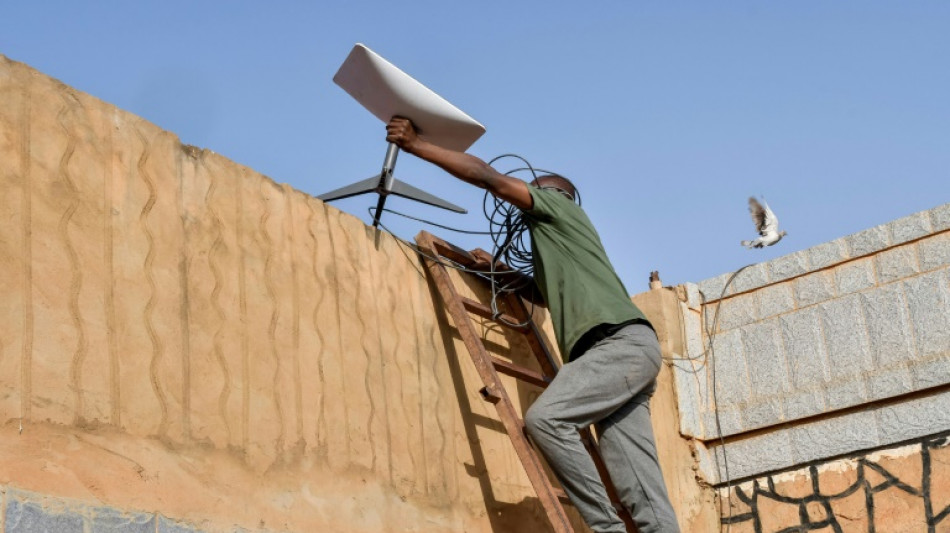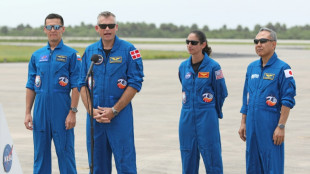
-
 Chainsaw-wielding Musk savors Trump's return to White House
Chainsaw-wielding Musk savors Trump's return to White House
-
Trump meets with Tiger, PIF and PGA Tour bosses to reunite golf

-
 Roma reach Europa League last 16 as 10-man Ajax scrape through
Roma reach Europa League last 16 as 10-man Ajax scrape through
-
MLS hoping for World Cup buzz in 30th season

-
 Bolivia's Morales launches 4th presidential bid, defying term limit
Bolivia's Morales launches 4th presidential bid, defying term limit
-
Harris Reed opens with 'rebellious' show at London Fashion Week opening

-
 Stocks mostly fall on tepid Walmart outlook, geopolitical worries
Stocks mostly fall on tepid Walmart outlook, geopolitical worries
-
Argentine court dismisses charges against 3 accused in death of singer Liam Payne

-
 Musk in X spat with Danish astronaut over 'abandoned' ISS crew
Musk in X spat with Danish astronaut over 'abandoned' ISS crew
-
Bond franchise shake-up moves spy into Amazon stable

-
 New York seeks hundreds of millions of dollars in 'vaping epidemic' case
New York seeks hundreds of millions of dollars in 'vaping epidemic' case
-
Dybala double leads Roma into Europa League last 16

-
 'Lot of fun' - Vance savors Trump's return to White House
'Lot of fun' - Vance savors Trump's return to White House
-
Mavs' Davis 'making good progress' after adductor strain

-
 Moon or Mars? NASA's future at a crossroads under Trump
Moon or Mars? NASA's future at a crossroads under Trump
-
Bucks' Portis banned 25 games for violating NBA anti-drug policy

-
 England captain Itoje glad of 'Superman' Hill's help against Scotland
England captain Itoje glad of 'Superman' Hill's help against Scotland
-
EU trade chief says tariff reciprocity 'must work for both' sides

-
 Curfew imposed after bomb attacks in Colombia injure six
Curfew imposed after bomb attacks in Colombia injure six
-
Andreeva, 17, stuns Swiatek to reach Dubai semis with landmark win

-
 Wembanyama to miss rest of NBA regular season with blood clot
Wembanyama to miss rest of NBA regular season with blood clot
-
Pope's condition 'slightly improving' on seventh day in hospital

-
 Comeback hero Shami says wicket-taking mindset alive
Comeback hero Shami says wicket-taking mindset alive
-
Spotify adds more AI-generated audiobooks

-
 Alcaraz dumped out by Lehecka in Qatar Open quarters
Alcaraz dumped out by Lehecka in Qatar Open quarters
-
Victor Wembanyama to miss rest of NBA regular season: Spurs

-
 Scotland coach Townsend eager to extend England run as Russell passed fit
Scotland coach Townsend eager to extend England run as Russell passed fit
-
Five things to know about Bond, James Bond

-
 Vance savors Trump's 'fun' return to White House
Vance savors Trump's 'fun' return to White House
-
Bavuma wary of Afghanistan challenge in Champions Trophy

-
 Pope 'sitting up, eating' in seventh day in hospital
Pope 'sitting up, eating' in seventh day in hospital
-
'Fixated' man who approached Raducanu is given restraining order

-
 Hong Kong's oldest pro-democracy party prepares to shut down
Hong Kong's oldest pro-democracy party prepares to shut down
-
Andreeva, 17, stuns Swiatek to reach Dubai semi-finals with landmark win

-
 Mexico says won't accept US 'invasion' in fight against cartels
Mexico says won't accept US 'invasion' in fight against cartels
-
Burundi forces flee DR Congo as conflict sparks refugee wave

-
 Stocks in the red as investors worry about growth and inflation
Stocks in the red as investors worry about growth and inflation
-
Gill ton powers India to win over Bangladesh in Champions Trophy

-
 Ireland match no time to experiment, says Wales coach Sherratt
Ireland match no time to experiment, says Wales coach Sherratt
-
Bomb attacks in Colombia injure six

-
 Netflix says to spend $1 billion producing content in Mexico
Netflix says to spend $1 billion producing content in Mexico
-
Bond franchise shifts to Amazon as Broccoli family steps back

-
 Unfair? Figures belie Trump's claims on EU trade balance
Unfair? Figures belie Trump's claims on EU trade balance
-
Putin hails Russia's huge number of 'terror' convictions

-
 Israel denounces Hamas as 'monsters' for staging of hostage bodies handover
Israel denounces Hamas as 'monsters' for staging of hostage bodies handover
-
Rublev downs de Minaur on eighth match point in Qatar

-
 Teenager kills two women in knife attack at Czech shop
Teenager kills two women in knife attack at Czech shop
-
Trump goads '51st state' Canada ahead of hockey grudge match

-
 EU trade chief says tariff reciprocity 'must work for both' bloc and US
EU trade chief says tariff reciprocity 'must work for both' bloc and US
-
Africa's first G20 meeting opens with call for 'cooperation'


Niger turns to satellites to bridge digital divide
Less than a third of Niger's vast territory has internet access, so the west African country is betting on satellite broadband to bridge the digital divide in remote rural areas.
The patchy coverage is mostly down to a lack of investment and the destruction of relay antennae by the numerous armed groups active in the country, according to electronic communications regulator ARCEP.
In November, Niger's military rulers granted a five-year contract with US billionaire Elon Musk's company Starlink to provide high-speed internet access across the Sahel state.
It is one of around 15 African countries to have authorised the use of Starlink's thousands of satellites on their territory.
"Essential services that drive economic development -- banks, hospitals, schools, the energy and farming sectors -- all rely on the internet and data," said economist Ibrahim Adamou Louche.
Communications Minister Sidi Ahmed Raliou predicted the move would provide internet access to "about 80 to 100 percent" of Niger -- 1,267 square kilometres (490 square miles) largely covered by desert plains and sand dunes.
The deal is lucrative for the US company.
In a country where almost 50 percent of the population earns less than a dollar a day, according to the World Bank, users who want internet access must pay between 260,000 and 400,000 CFA francs ($414 and $637) for the satellite firm's necessary basic equipment.
- Big in the country -
The drive to access the internet has also spawned illicit operations.
The equipment, much of it imported from neighbouring Nigeria, is sometimes brought across the border illegally.
Users who cannot afford the equipment must pay the US company for one-off access to the internet for a limited amount of time.
"On market days especially, people congregate round the wifi router," said Moussa Djibrilla, a secondary school teacher in the rural western community of Mangaize.
Much of the enthusiasm for satellite broadband comes from remote areas, said vendor Ali Sat.
In the capital, Niamey, sales of equipment have not so far taken off and only a handful of homes are connected, he added.
In rural areas, the situation is different.
Technician Moumouni Harouna said the biggest demand for satellite internet equipment came from people "out in the bush" who liked it because "they don't lose connection".
- Elusive signal -
"We're back in civilisation," grinned Alfa Hama, a villager in the western hamlet of Gorou, near the border with Mali, where the local phone and internet relay antennae were destroyed eight years ago.
"We don't need to go six kilometres and climb to the top of a hill to get an elusive signal any more," he said. "The wifi is right here."
For a price, high-speed internet access is now available in some parts of the Tenere desert, through which travellers pass, alongside thousands of migrants seeking to make the perilous journey out of one of the world's poorest countries and through Libya towards the El Dorado of Europe.
In Tabelot, a little further south, illegal gold mining operations, markets and the long-distance bus station all offer connection points for those who can pay.
Local Touareg chief Youssaf Houssa said whole neighbourhoods sometime clubbed together to afford a piece of communal satellite equipment.
"People are able to come together more thanks to WhatsApp groups and do business online," he said.
Niger's four long-standing telecommunications operators, who are often criticised for the quality of their services, are less than keen to see the military rulers embrace the new US competitor.
"Satellite solutions complement what we do but they can't replace the advantages we offer in terms of cost, performance and personal service," said a senior official from one of the operators, asking to remain anonymous.
I.Meyer--BTB

